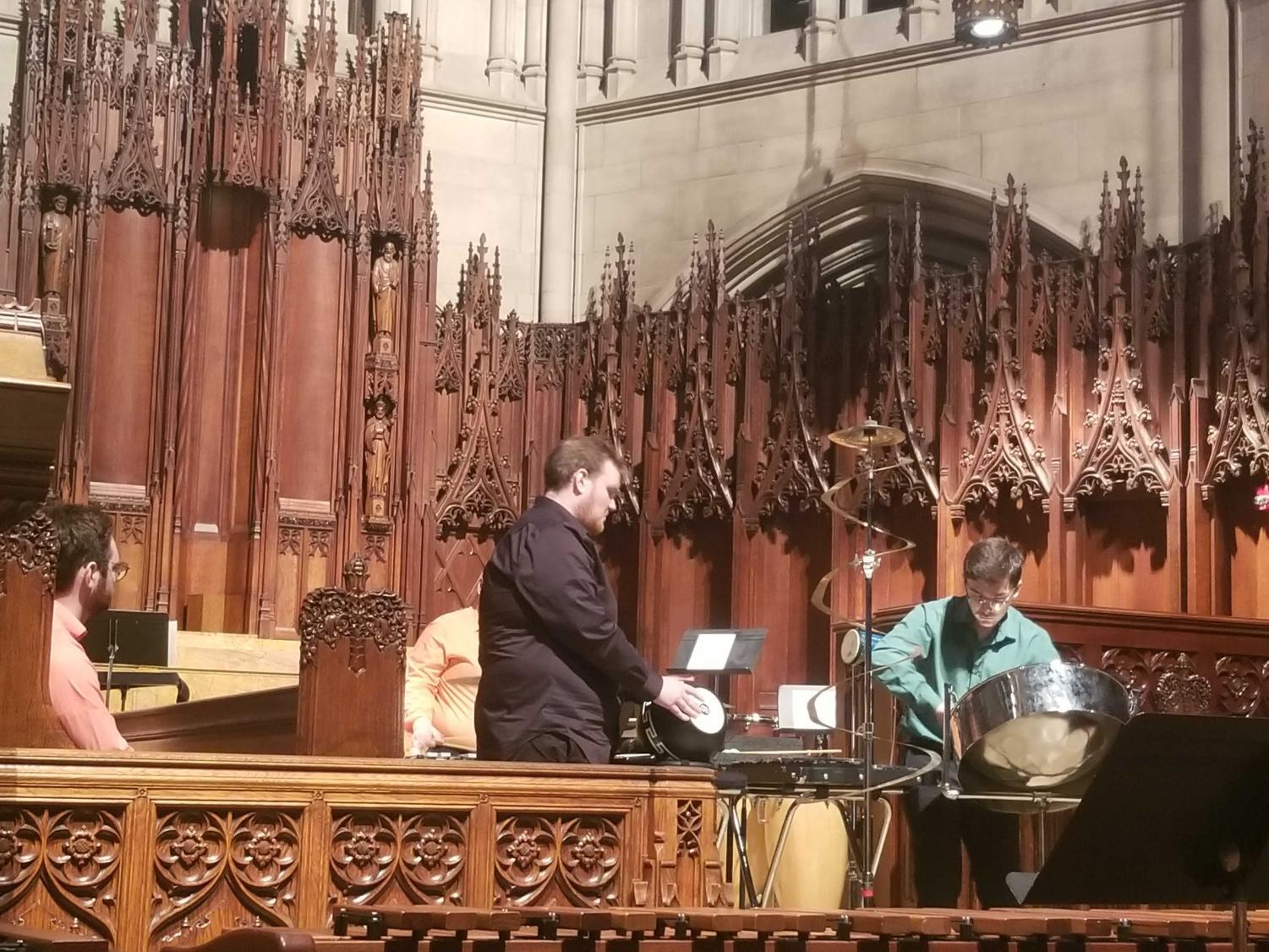Slippery Rock University percussion ensemble rocks Heinz Chapel


The Slippery Rock University Percussion Ensemble combined Taiwanese folk music, Radiohead and contemporary a cappella at its performance at Heinz Chapel on Sunday.
On the surface, Taiwanese folk music, Radiohead and contemporary a cappella represent three vastly different and conflicting styles of music. The Slippery Rock University Percussion Ensemble would beg to differ.
The ensemble played an eclectic variety of pieces spanning several time periods, geographic areas and musical genres in a concert held at the Heinz Memorial Chapel on Sunday. Directed by David Glover, an assistant professor of percussion and chair of the music department at Slippery Rock, the concert featured students playing a wide range of percussion instruments.
The show opened with David Skidmore’s 2004 “Ritual Music” — a piece that started low and rumbling before launching suddenly into an intense uproar of drums and marimba. According to Glover, the ensemble thoroughly rehearsed and performed pieces like “Ritual Music” well before bringing it to Heinz Memorial Chapel. He said the musicians first began rehearsing some of their music a year beforehand and performed some earlier in the fall.
“It’s been about a year thinking about [the concert] and putting things together,” he said. “Not necessarily rehearsing all summer or anything like that, but many, many hours went into prep.”
Other pieces were prepared just a few weeks before the concert, with little time for musicians to practice as a group. “Ghanaia” was one such piece — a marimba solo from the German composer Matthias Schmidt that draws from the rhythms of traditional Ghanian music and requires the musician to play with four mallets.
Nico Ricciuti, a junior music therapy major who performed “Ghanaia” with accompaniment by Glover, said although he had been practicing the piece for two years, he rarely had accompaniment while doing so — a factor that added to the stress and excitement of playing a solo.
“For a solo, everything is about you,” Ricciuti said. “You can’t rely on hearing somebody else. I barely practiced with Doc [Glover] before we did this. He just jumped in and was like, ‘Alright, let’s go.’”
While “Ghanaia” is a piece originally written for percussion, the ensemble’s sixth piece of the performance, “Sleep,” is intended for a choral group. According to composer Eric Whitacre’s website, singer Julia Armstrong commissioned the sorrowful piece in 1999 in memory of her late parents.
The lyrics of the choral version reflect the theme of Robert Frost’s poem “Stopping by Woods on a Snowy Evening,” and even without lyrics, the arrangement performed by the percussion ensemble holds the same contemplative feeling as the poem. Eight musicians, all playing marimba, tapped quickly on their instruments, lengthening the sound of each note in a technique called tremolo.
As a result, their music had a similar sound to the human voice, allowing them to mimic the melancholy choral quality of Whitacre’s original work. Glover said he enjoys putting together pieces like “Sleep” because of the way they push the limits of percussion instruments and create unusual sounds.
“I’m always eager to get my hands on music that wasn’t meant for these instruments and put it on them, because the result really is beautiful,” he said during the show.
Anastasia Long, a senior music education major, said she also appreciated the opportunity to cross the traditional boundaries of percussion and apply new aspects of her musical abilities to the marimba. She said she enjoyed singing the choral arrangement of the song, which she used to help her better play the percussive version.
“[“Sleep”] is my favorite choir piece, and when [Glover] passed it out I got really excited,” she said. “I can think of the words in my head and work out the melody and follow that, so [playing the song] was easier.”
Glover also noted that the space of the Heinz Memorial Chapel lent itself to the piece. He said that the Gothic-revival architecture, with its echoing acoustics, created a great atmosphere in which to perform the piece.
“[‘Sleep’] sounded really nice in [the Chapel] especially, so I think we were all most looking forward to playing that piece, and I think it’s one of my favorites [of the evening],” he said.
The concert ended with another percussive twist on a non-percussive song — “Daydreaming” by Radiohead — which embodied the eclectic nature of the ensemble’s set. Four musicians moved between playing several instruments, including a steel drum, a cymbal cut into a spiral shape and stretched on a stand and a melodica — which is an instrument resembling a small piano connected to a plastic tube.
According to Glover, the group tends to avoid traveling because of the volume of instruments and equipment it uses, so a performance in a space as small as the Chapel is somewhat of a rarity.
“It’s a lot to move this stuff, like we have to get a facilities truck and pack it jam tight with everything we own,” he said. “We also have to choose pieces that fit in the space, so we usually only do two to three performances [outside Slippery Rock a year].”
Dante Burns, a sophomore double majoring in music education and performance, said this wide variety of instruments is one of the most appealing aspects of participating in the percussion ensemble. He said playing with the group widened his horizons and brought him closer to a community of musicians he wouldn’t have otherwise had the opportunity to work with.
“I think being able to perform in a percussion ensemble is a really nice way of using a bunch of instruments you don’t really get to use in other ensembles, and we get to be together as percussionists,” he said.
Recent Posts
Opinion | Duolingo: A beacon of hope or an agent of evil?
Duo was brutally plowed down by a shiny, ugly Tesla Cybertruck. By extension, Elon Musk…
Marcello Hernández fans fill WPU Assembly Room, and then some
On Monday night, comedian Marcello Hernández “came all this way” to Pitt, delivering a set…
97th Academy Awards post-mortem: Should we replace the Academy voters with a poll on Letterboxd?
While blockbusters like “Dune: Part Two” and cultural phenomena like “Challengers” dominated at the box…
Five years later: COVID-19 and quarantine’s lasting legacy in national and local health care industries
At the fifth anniversary of the COVID-19 pandemic, UPMC and Pitt Student Health Services reveal…
Column | DK Metcalf trade is reputation-defining for Steelers’ front office
At a turning point in the franchise, Pittsburgh Steelers fans were enthused when Omar Khan…
‘H2PinskyBudike’ ticket wins 2025 SGB election
Student Government Board announced election results for president, vice president, and board member positions and…

